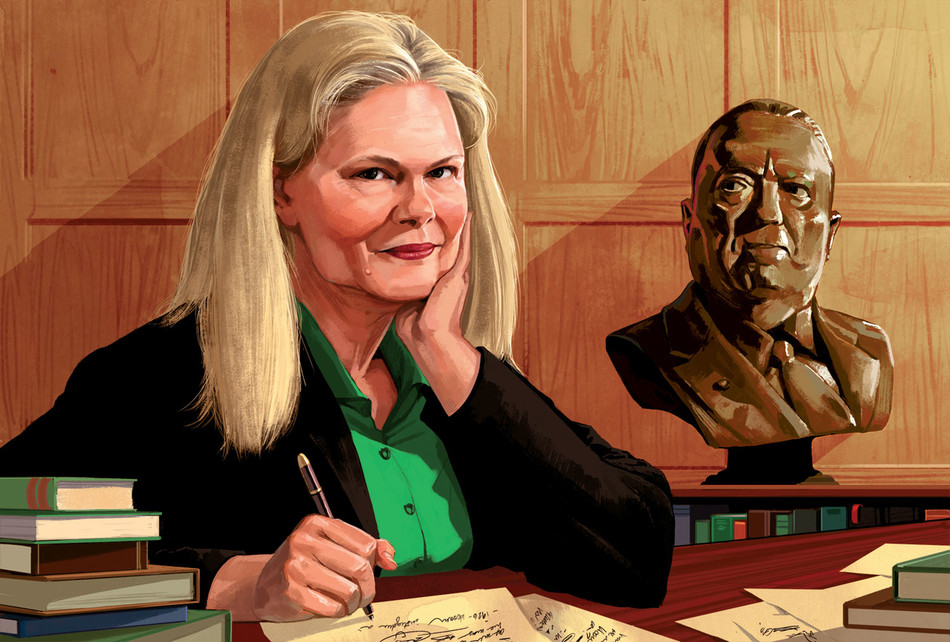Beverly Gage ’04GSAS first got to know J. Edgar Hoover at Columbia. She was researching her PhD dissertation, “The Wall Street Explosion: Capitalism, Terrorism, and the 1920 Bombing of New York,” when she discovered that Hoover had been a young federal agent at the Bureau of Investigation (as the FBI was then called) charged with monitoring domestic radicals. That’s when the idea of a biography flashed across her mind: here was the inchoate bureaucrat, already building his arsenal of tactics and ideologies — political surveillance and anti-communism among them — that he would greatly expand as head of the FBI from 1924 until his death in 1972.
Gage, a professor of history at Yale, recently shared this story onstage at the Forum, on Columbia’s Manhattanville campus, where she and two other historians were awarded the annual Bancroft Prize in American History and Diplomacy. Gage’s G-Man: J. Edgar Hoover and the Making of the American Century — along with Kelly Lytle Hernández’s Bad Mexicans: Race, Empire, and Revolution in the Borderlands and John Wood Sweet’s The Sewing Girl’s Tale: A Story of Crime and Consequences in Revolutionary America — was honored by an audience of fellow historians, book editors, students, past Bancroft recipients, and the public.
The Bancroft Prize is one of the oldest, most prestigious awards for books on American history and diplomacy. Each year, a jury of three historians — including one from Columbia or Barnard — reads more than two hundred submissions and selects the winners. Administered by University librarian and vice provost Ann Thornton, the prize was established in 1948 through a bequest from the historian Frederic Bancroft 1885GSAS in honor of himself and his brother Edgar Bancroft 1880LAW. As Thai Jones ’02JRN, ’12GSAS, curator of American history at Columbia University Libraries, explains, the prize “best celebrates the type of work that historians cherish most: exciting new arguments, forgotten histories, dramatic reinterpretations. The Bancroft is really considered to be the historians’ prize.”
During the ceremony, Gage recalled the “reinvention” of political history that was happening during her time at Columbia — new ways of thinking about the history of sexuality, of conservatism — and how Hoover, long caricatured as a villain, struck her as a fascinating subject, even if she did not admire him. “Hoover was too important and too complicated,” Gage said, “to just leave as a one-dimensional figure.” Instead, she left him as an eight-hundred-page book.
Until last year, the Bancroft Prizes were bestowed in the Faculty Room in Low Library, with an invitation-only formal dinner, but the event is now open to all, with author talks, a “winners’ circle” of past recipients, and, afterward, in the Forum’s airy, glass-enclosed atrium, a spread of food, drinks, and mingling historians.
At this year’s reception you could hardly drop an hors d’oeuvre without hitting the shoe of a giant. Two-time Bancroft awardee David Blight was there. So were past winners Alice Kessler-Harris and Jean Strouse. By the book table, Eric Foner ’63CC, ’69GSAS, another two-time recipient, chatted with his former student Anne Kornhauser ’04GSAS, who is now chair of the history department at City College. People kept stopping by to greet Foner and convey their gratitude for his work. Foner was visibly moved. “It never gets old,” he said.
The Bancroft Prizes also honor Columbia PhD dissertations, and this year’s winners — Yoav Hamdani ’22GSAS and Justine Meberg ’22GSAS — stood within a knot of well-wishers. Nearby, Columbia historian George Chauncey, who chaired last year’s jury, hinted at the sacrifices that come with having to read dozens of books over winter break. “It was not our best Christmas vacation,” he said with a laugh. Foner, meanwhile, was in lively dialogue with Blight. Seeing this, John Fabian Witt, a Yale law professor who won the Bancroft in 2013 for Lincoln’s Code: The Laws of War in American History, approached them, hoping to absorb the rarefied discourse of two major US historians. What he got was a discussion of the Yankees’ bullpen.
Finally, Gage made her way over to Foner, who had been one of her mentors. They spoke of Gage’s adviser, Alan Brinkley, who had died in 2019. Then Gage brought out a fact that surprised and delighted her listeners: in 2004, Gage’s study of the 1920 Wall Street bombing had won the Bancroft dissertation prize. Gage is the second person — the other is the social historian Thomas Dublin ’75GSAS — to have won both awards.
A few weeks after the Bancroft Prizes, another Columbia-based awards committee announced its winners, and Gage and her book were again among them. The author of G-Man will return to the University this October, where, at a ceremony in the Low Rotunda, she will accept the 2023 Pulitzer Prize in biography.
This article appears in the Fall 2023 print edition of Columbia Magazine with the title "Spying on the Past."



